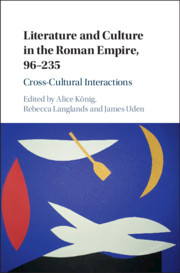Book contents
- Literature and Culture in the Roman Empire, 96–235
- Literature and Culture in the Roman Empire, 96–235
- Copyright page
- Contents
- Figures
- Contributors
- Preface
- Timeline
- Abbreviations
- Map
- Introduction
- Part I Refiguring Roman and Greek Interactions
- Part II Imperial Infrastructure: Documents and Monuments
- Chapter 7 Constructing a New Imperial Paradoxography
- Chapter 8 A Formation of a Christian Archive?
- Chapter 9 Keeping/Losing Records, Keeping/Losing Faith
- Chapter 10 Shaping Buildings into Stories
- Chapter 11 Architectural Criticism in the Roman World and the Limits of Literary Interaction
- Chapter 12 Dying for Justice
- Part III Cultural Translation and Transformation
- References
- Index
Chapter 12 - Dying for Justice
Narratives of Roman Judicial Authority in the High Empire
from Part II - Imperial Infrastructure: Documents and Monuments
Published online by Cambridge University Press: 28 April 2020
- Literature and Culture in the Roman Empire, 96–235
- Literature and Culture in the Roman Empire, 96–235
- Copyright page
- Contents
- Figures
- Contributors
- Preface
- Timeline
- Abbreviations
- Map
- Introduction
- Part I Refiguring Roman and Greek Interactions
- Part II Imperial Infrastructure: Documents and Monuments
- Chapter 7 Constructing a New Imperial Paradoxography
- Chapter 8 A Formation of a Christian Archive?
- Chapter 9 Keeping/Losing Records, Keeping/Losing Faith
- Chapter 10 Shaping Buildings into Stories
- Chapter 11 Architectural Criticism in the Roman World and the Limits of Literary Interaction
- Chapter 12 Dying for Justice
- Part III Cultural Translation and Transformation
- References
- Index
Summary
This chapter examines how different cultural and religious groups constructed narratives of Roman justice between the late first and late third century, and assesses the interactions and connections between these narratives. It focuses on three case studies: (i) the Acta Alexandrinorum, accounts of embassies and trial scenes between Alexandrian Greeks and emperors; (ii) Christian texts, chiefly the apocryphal acts featuring encounters between apostles and emperors and the martyr acts recounting trials before Roman governors; and (iii) Jewish literature, including 1 and 2 Maccabees, and rabbinic texts which include discussions of Roman justice. The narratives of justice created by Alexandrian Greeks, Christians, and Jews in the High Empire are united by the fact that they all rewrite the public transcript of Roman legal authority. These stories show evidence of cross-cultural interactions in both form and content, but this chapter argues that the ultimate purpose and agenda of the different narratives were specific to the community that produced them.
Keywords
- Type
- Chapter
- Information
- Literature and Culture in the Roman Empire, 96–235Cross-Cultural Interactions, pp. 269 - 288Publisher: Cambridge University PressPrint publication year: 2020
- 2
- Cited by



